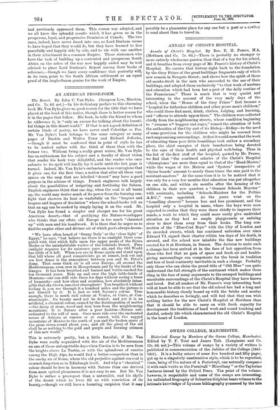AN AMERICAN PROSE-POEM.
The Desert. By John C. Van Dyke. (Sampson Low, Marston, and Co. is. 6d. net.)—In his dedicatory preface to this charming book Mr. Van Dyke gives us good reason for the title that we have placed at the head of this notice, though there is better reason for it in the pages that follow. His book, he tells the friend to whom he addresses it, is " only an excuse for talking about the beauti- ful things in this desert world." If that is not a good definition of certain kinds of poetry, we have never read Coleridge or Poe. Mr. Van Dyke's book belongs to the same category as many pages of Ruskin and Walter Pater and Richard Jefferies, —though it must be confessed that in point of style he has to be ranked rather with the third of these than with the former two. Without being a really great writer, Mr. Van Dyke has an enthusiasm for his subject and a faculty of direct vision that render his book very delightful, and the reader who once submits to its spell will hardly lay it aside until the last page is turned. Indeed, Mr. Van Dyke's enthusiasm is so contagious that it gives one, for the first time, a notion that after all these vast spaces on the map that are labelled "desert" may have a good purpose in the scheme of things. French engineers talk largely about the possibilities of irrigating and fertilising the Sahara. English engineers think that one day, when the coal is all burnt up, the world may derive much of its power from the burning sun- light that showers its heat so wastefully on the "leagues and leagues and leagues of desolation" where the school-books tell us that an egg can be cooked by simply laying it on the sand. Mr. Van Dyke has found a simpler and cheaper use for his great American desert,—that of gratifying the Nature-worshipper who thinks that our effete old Europe is too much "clammed up" with man and his handiwork. It is there that he urges us to find the ampler ether and diviner air of which poets always dream:
"We have often heard of ' Sunny Italy' or the ' clear light' of Egypt," he says, " but believe me there is no sunlight there com- pared with that which falls upon the upper peaks of the Sierra Madre or the uninhabitable wastes of the Colorado Desert. Pure sunlight requires for its existence pure air, and the Old World has little of it left. When you are in Rome again and stand upon that hill where all good romanticists go at sunset, look out and see how dense is the atmosphere between you and St. Peter's dome. That same thick air is all over Europe, all around the Mediterranean, even over in Mesopotamia and by the banks of the Ganges. It has been breathed and burned and battle-smoked for ten thousand years. Ride up and over the high table-lands of Montana—one can still ride there for days without seeing a trace of humanity—and how clear and scentless, how absolutely intan- gible that sky-blown, sun-shot atmosphere ! You breathe it without feeling it, you see through it a hundred miles and the picture is not blurred by it. It is just so with Nature's colour. True enough, there is much rich colour at Venice, at Cairo, at Con- stantinople. Its beauty need not be denied; and yet it is an artificial, a chemical colour, caused by the disintegration of matter —the decay of stone, wood and iron torn from the neighbouring mountains. It is Nature after a poor fashion—Nature sub- ordinated to the will of man. Once more ride over the enchanted mesas of Arizona at sunrise or at sunset, with the ragged mountains of Mexico to the south of you and the broken spurs of the great sierra round about you; and all the glory of the old shall be as nothing to the gold and purple and burning crimson of this new world."
This is extremely pretty, but a little fanciful; if Mr. Van Dyke were really acquainted with the air of the Mediterranean on one of those unforgettable days when Corsica is to be seen from the heights above La Turbie, or with the splendours of sunrise among the High Alps, he would find a better comparison than in the smoky air of Rome, where the old prejudice against sea-coal is as much forgotten as in Edinburgh itself. And why a " chemical " colour should be less in harmony with Nature than one derived from mere optical phenomena it is not easy to see. But Mr. Van Dyke is rather a prose-poet than a naturalist, and his idylls of the desert which he loves fill us with conviction of its beauty,—though we still have a haunting suspicion that it may possibly be a pleasanter place for any one but a poet or a cowboy to read about than to travel in.


















































 Previous page
Previous page